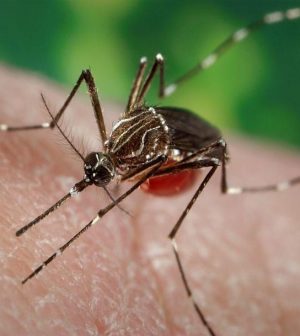- Could Your Grocery Store Meat Be Causing Recurring UTIs?
- Are You Making This Expensive Thermostat Error This Winter?
- Recognizing the Signs of Hypothyroidism
- 10 Strategies to Overcome Insomnia
- Could Artificial Sweeteners Be Aging the Brain Faster?
- Techniques for Soothing Your Nervous System
- Does the Water in Your House Smell Funny? Here’s Why
- Can a Daily Dose of Apple Cider Vinegar Actually Aid Weight Loss?
- 6 Health Beverages That Can Actually Spike Your Blood Sugar
- Treatment Options for Social Anxiety Disorder
3-Dose Malaria Vaccine Shows Promise in African Trial

FRIDAY, Jan. 6, 2023 (HealthDay News) – New research has confirmed that a three-dose malaria vaccine is both safe and effective in West African adults, including those previously exposed to malaria.
Researchers at the University of Maryland Center for Vaccine Development and Global Health (CVD) led work on the Plasmodium falciparum sporozoite (PfSPZ) vaccine.
The clinical trial, which included 80 participants, compared three doses of the PfSPZ vaccine against a placebo. Vaccine efficacy — a measure of how many vaccinated people got malaria — was 48% after six months and 46% at an 18-month follow-up.
“Our study shows that the vaccine can be given to malaria-experienced adults in a highly endemic area and still provide protection, which is difficult and complicated as these individuals already have significant immune responses to malaria parasites that must be overcome by a vaccine for it to be successful,” said corresponding author Dr. Matthew Laurens, director of the International Clinical Trials Unit in the Malaria Research Group at CVD.
The PfSPZ vaccine is made by Maryland-based Sanaria Inc., using a live but weakened form of the malaria parasite Plasmodium falciparum sporozoite.
In challenge studies where volunteers were intentionally exposed to the parasite, it provided 90% protection.
Malaria is a serious and sometimes fatal disease caused by a parasite that commonly infects a certain type of mosquito that feeds on humans. People who get malaria are typically very sick, with high fevers, shaking chills and flu-like illness, according to the U.S. Centers for Disease Control and Prevention.
In African adults who previously had malaria, PfSPZ provided 52% efficacy — a measure of how well a vaccine prevents infection and protects against severe disease — against naturally transmitted malaria infection. The protection lasted between eight and 14 months.
For the new study, researchers hoped to reduce injections from five shots to three, while also improving vaccine efficacy.
They assessed the vaccine in two-parts: The first, which included 32 adults, was designed to determine the highest dose of vaccine that does not produce harmful side effects. In the randomized trial in 2017, 39 of 80 participants received the vaccine.
Participants were healthy men and non-pregnant women between 21 and 40 years of age.
“New strategies are needed to achieve the United Nations sustainable development goal of a 90% reduction in malaria incidence and [death rates] by 2030,” said Dr. Mark Gladwin, dean of the University of Maryland School of Medicine. “Innovative vaccines that provide a higher level of protection against malaria are urgently needed to help to achieve this goal.”
For decades, scientists have tried to develop an effective malaria vaccine but the shots have provided little protection in people who had previously been infected. The first vaccine against malaria (RTS,S/AS01) was approved by the World Health Organization (WHO) in October. It provides modest protection against the disease.
Malaria infected about 241 million people worldwide in 2020 and claimed 627,000 lives.
Researchers plan to conduct additional trials of the PfSPZ vaccine in other groups, including children, travelers, military personnel and pregnant women. Studies are ongoing, including a trial at University of Maryland that would administer the three vaccine doses in one month, a schedule suitable for travelers and the military. Results are expected this year.
The study was funded by the National Institute of Allergy and Infectious Diseases. Findings were recently published in Science Translational Medicine.
More information
The U.S. Centers for Disease Control and Prevention has more on malaria.
SOURCE: University of Maryland School of Medicine, news release, Jan. 4, 2023
Source: HealthDay
Copyright © 2026 HealthDay. All rights reserved.










